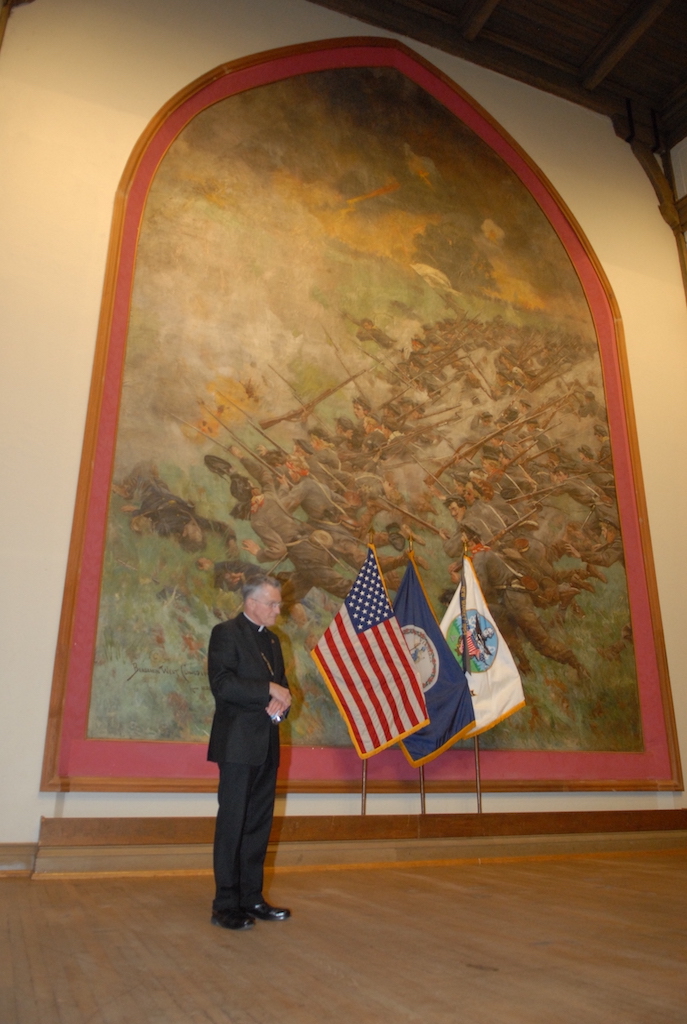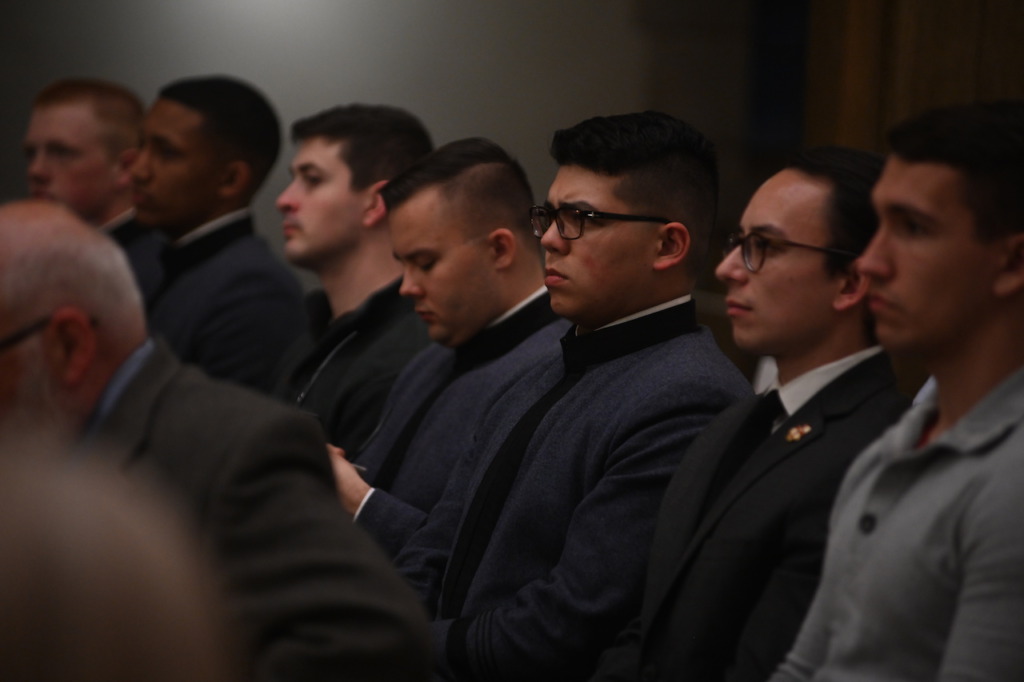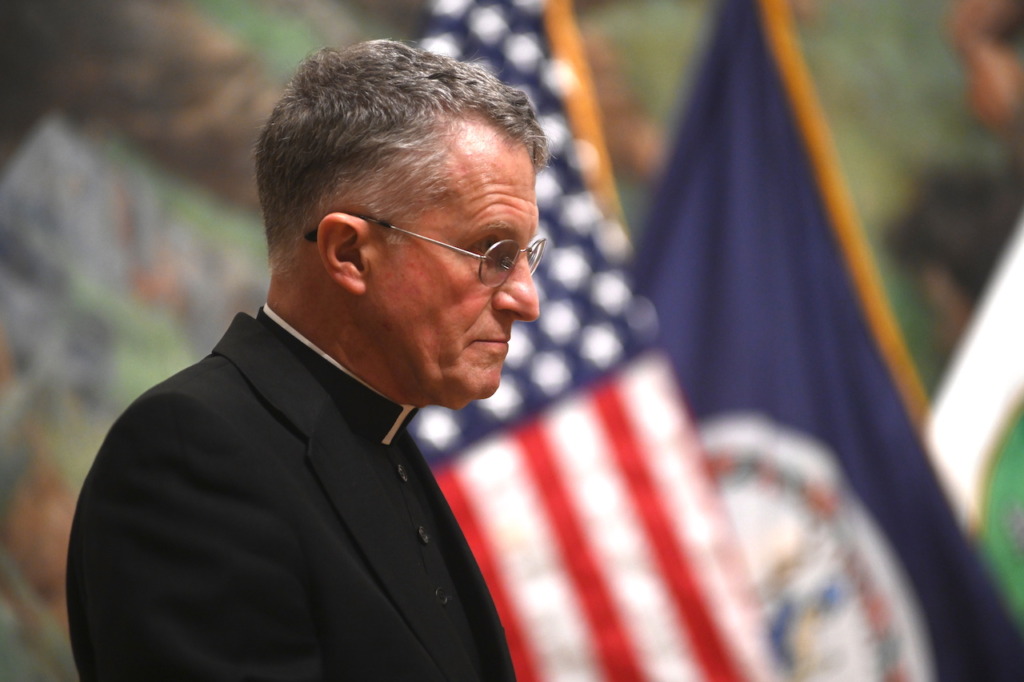Men and women going to war need lots of gear — uniforms, boots, rations. They travel in tanks, ships and planes, and train to use a variety of weapons — rifles, artillery, missiles.
Archbishop Timothy P. Broglio says the faithful serving in the military also need to be armed with something else — a conscience, formed by church teaching, expert knowledge and scripture.
“No one has the authority to coerce a person into violating his or her conscience for any reason,” he told a group at Virginia Military Institute Feb. 24.
“When we talk about being a Catholic in the military not every order obligates a soldier, sailor, Marine, airman, coastie, or guardian to obey. Even in a hierarchical structure such as the military, it means that the human person is not dispensed from the obligation to follow his or her conscience,” the archbishop said.
As head of the Archdiocese for the Military Services USA, Archbishop Broglio is responsible for the church’s ministry to Catholics serving in all branches of the armed forces at home and abroad, active duty and reserves, along with those working in Veterans Administration hospitals and members of the faithful serving in the federal government overseas. He is also the current president of the U.S. Conference of Catholic Bishops.
His talk was sponsored by St. Patrick Catholic Church in Lexington as part of the parish’s 150th anniversary celebration. About a hundred people came to VMI’s Memorial Hall to hear the trim man with a firm jaw and regulation haircut that day, the one-year anniversary of Russia’s invasion of Ukraine.

Standing before the mural of VMI cadets fighting at the Battle of New Market in 1864 that stretches from floor to ceiling, the archbishop mentioned that he spent five days in Ukraine just after Christmas, “overwhelmed by the destruction, the loss of life but buoyed up by the spirit of the Ukrainian people.”

The mayor of the Lviv, the sixth-largest city in that country, gave him a wristband that says “Unbroken” that he continues to wear.
“To me, it seems unbelievable that in 2023 there is actually a war in Europe, one country simply invaded another,” the archbishop said.
‘Fight for faith’
The main message of his remarks was the duty of those in the military to listen to their conscience. This duty arises despite the risk of discipline or even dismissal, a dilemma service members faced when the Pentagon required those on active duty to get COVID-19 shots, starting in August 2021, he said.
“The choice was be vaccinated or be discharged,” Archbishop Broglio noted. “The choice is made for you and few waivers are granted.”
About 99% complied; more than 8,000 refused, though not all on religious grounds, and were discharged.
“The military is by definition young, fit and resilient – there is good chance that the infirmity would not be fatal for them,” the archbishop said. “However, they could transmit to others for whom it would be fatal. As a shepherd, while I urged people to be vaccinated, I was obliged to point out that the church taught that no one should be forced.”
Adding to the dilemma, he said, was “the unusual politicization of the vaccine, mask wearing and everything else. It was quite remarkable, but it did overrule a certain measure of common sense on both sides of the question.” Congress lifted the vaccine mandate in December.
“There will always be attempts by power to coerce subjects to act in a certain way,” he said.
For Catholic nurses and doctors who try to defy the military’s support of abortion rights that coercion can mean a bad assignment, being passed over for promotion, or extra duty to “wear down the opposition and extract a price for the dissent,” he said.

Archbishop Broglio advises those facing a crisis of conscience to talk to their chaplain. Anything a service member says to a chaplain is confidential, he said, even outside the seal of confession. Chaplains can’t be forced to act against tenets of their faith, disobey directives of their archbishop, and can’t be limited in what they preach or teach. But even those in the military without this protection should not be afraid to fight for their faith.
“It is more difficult for them to object and the lines of battle are less clear,” Archbishop Broglio said. “However, it is possible to prevail … and to win.”
The military has also become a place to find those who work to win souls for Christ. The archbishop said it’s the single largest source of priestly vocations in the United States today. According to the Center for Applied Research in the Apostolate at Georgetown University, 11% of those about to be ordained in 2021 had a mother or father who had been active duty.
“That is a singularly impressive statistic and gives us great hope for the future,” he said.

‘Secret core, sanctuary’
Archbishop Broglio’s talk resonated with the VMI cadets who came to hear him.
“We’ve had a former commandant of the Marine Corps to come and speak about righteous dissent and what that means,” said senior Christian Dutton, who plans to accept a military commission after graduation. “And I think it kind of brings it full circle in a way when the archbishop of the U.S. military comes to talk about that too. It’s very thought-provoking and doesn’t make you so afraid to have dissenting or disagreeing opinions and personally makes myself more comfortable in being more outspoken.”
“As a cadet who’s not commissioning into the military after graduation,” said senior Jake Sekerak, “everything he was talking about was still applicable especially in the sense of the moral ground that we as Catholics have to kind of keep intact.”
That moral ground can be heard in “a voice ever calling him to love and to do what is good and to avoid evil sounds in his heart at the right moment,” Archbishop Broglio said. “For man has in his heart a law inscribed by God. His conscience is man’s most secret core and his sanctuary. There he is alone with God, whose voice echoes in his depths.”

